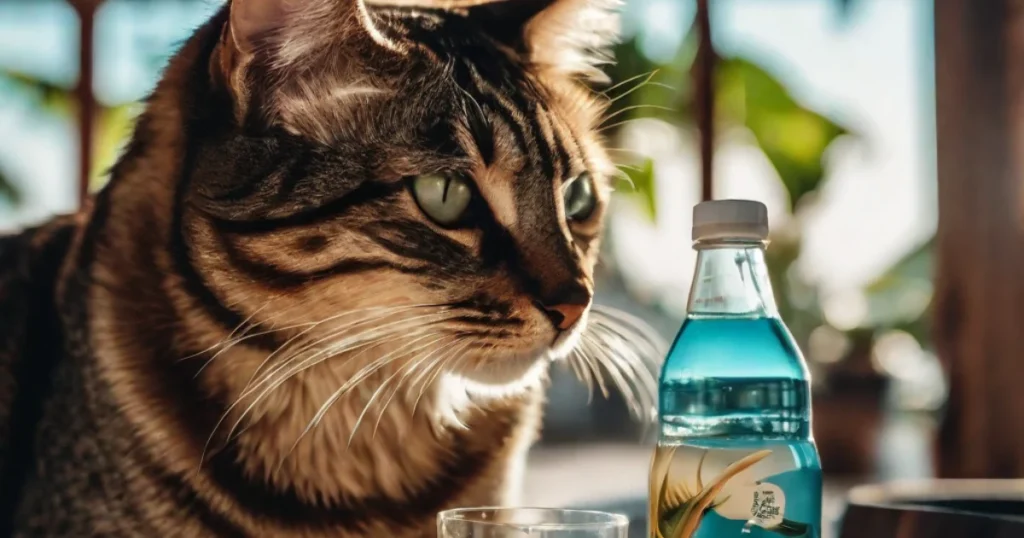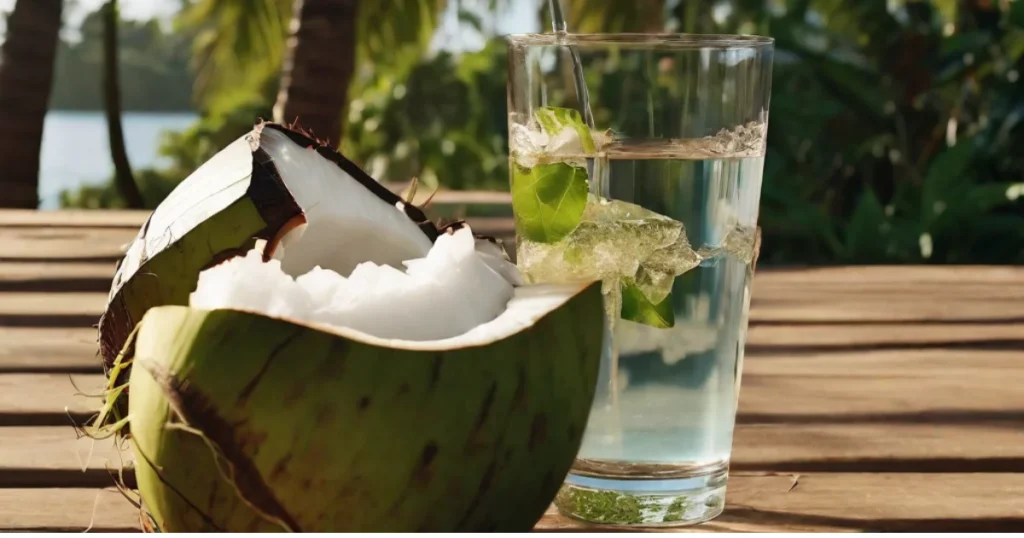Coconut water has become a popular beverage for humans in recent years, known for its refreshing taste and health benefits. But as cat owners, it’s natural to wonder if our feline friends can enjoy this drink too. After all, coconut water is derived from the same fruit that cats are known to love – coconuts. So, can cats have coconut water? Let’s delve into the topic and find out if this trendy drink is safe for our beloved cats.

Table of Contents
Unpacking the Contents of Coconut Water
Coconut water has gained popularity among humans for its delicious taste and various health benefits. But what exactly is coconut water made of? To answer that question, let’s unpack the contents of this trendy beverage and see if it’s safe for our feline friends.
Coconut water is the clear liquid found inside young coconuts. It is not to be confused with coconut milk, which is a thicker and more opaque liquid extracted from mature coconuts. Coconut water is rich in electrolytes like potassium, magnesium, and calcium. It also contains vitamins, antioxidants, and natural sugars. These properties make it a popular choice for re-hydrating and replenishing electrolytes after exercise or illness.
When it comes to cats, it’s important to note that they have different dietary needs than humans. While coconut water can be a healthy beverage for humans, cats are obligate carnivores, meaning they require a diet that consists primarily of meat. Their bodies are designed to extract all the necessary nutrients from animal-based proteins, and they have little need for plant-based foods.
Additionally, cats have a low thirst drive and typically obtain most of their water intake from their food. Providing them with fresh, clean water is usually sufficient to keep them hydrated. Offering coconut water as a source of hydration for your cat may not be necessary and could potentially upset their delicate digestive systems.
While coconut water itself is generally safe for cats in small quantities, it’s essential to consult with your veterinarian before introducing any new food or beverage into your cat’s diet. They will have the expertise to assess your cat’s individual needs and advise you on the best course of action.
The Potential Benefits and Risks of Coconut Water for Cats
Coconut water has gained popularity among humans for its refreshing taste and numerous health benefits. But what about our furry feline friends? Can they reap the potential benefits of coconut water too? Let’s take a closer look at the possible advantages and risks of introducing coconut water into a cat’s diet.
One potential benefit of coconut water for cats is its hydrating properties. Cats, like humans, need to stay adequately hydrated to maintain their overall health. While cats obtain most of their water intake from their food, providing them with additional fluids can be beneficial, especially during hot weather or illness. Coconut water is known for its hydrating properties, thanks to its high electrolyte content. The potassium, magnesium, and calcium found in coconut water can help replenish and balance electrolyte levels in cats, potentially aiding in hydration.
Another potential advantage is the presence of vitamins and antioxidants in coconut water. These nutrients can contribute to a cat’s overall well-being and immune system support. However, it’s worth noting that cats have different dietary requirements than humans, and their bodies are designed to extract necessary nutrients from animal-based proteins. While coconut water does offer some beneficial properties, it should never replace a cat’s main source of nutrition, which should be a balanced and complete diet of meat-based foods.
As with any new food or beverage, there are risks associated with introducing coconut water to cats. One potential risk is gastrointestinal upset. Cats have sensitive digestive systems, and any sudden dietary changes can lead to diarrhea or vomiting. Additionally, some cats may be allergic to coconut or have difficulty digesting the natural sugars present in coconut water.
It’s crucial to consult with your veterinarian before adding coconut water to your cat’s diet. They can provide personalized advice based on your cat’s specific needs and health conditions. Your veterinarian may recommend alternative ways to keep your cat hydrated or suggest other natural options that are better suited for feline consumption.
While coconut water may offer some potential benefits for cats, it’s essential to proceed with caution and prioritize your cat’s individual health and dietary requirements. Always consult with your veterinarian and monitor your cat closely when introducing any new food or beverage into their diet.

Understanding the Dietary Needs of Cats
To determine if coconut water is safe for cats, it’s crucial to understand their dietary needs. Cats are obligate carnivores, which means their bodies are designed to thrive on a diet that consists primarily of meat. They have specific nutritional requirements that are met through consuming animal-based proteins, such as essential amino acids and certain vitamins.
Unlike humans, cats lack the necessary enzymes to efficiently break down and digest plant-based foods. While coconut water does offer some nutritional benefits, it should never replace a cat’s main source of nutrition, which should be a balanced and complete diet of meat-based foods. It’s essential to prioritize your cat’s dietary requirements and provide them with a diet that fulfills their unique nutritional needs.
Additionally, cats have a low thirst drive and typically obtain most of their water intake from their food. This is why it’s crucial to offer fresh, clean water to cats at all times to keep them adequately hydrated. While coconut water may seem like a refreshing and hydrating option, it may not be necessary or suitable for feline consumption.
When considering introducing new foods or beverages into your cat’s diet, it’s always best to consult with your veterinarian. They can assess your cat’s individual needs, provide personalized advice, and recommend alternative ways to keep your cat hydrated if necessary.
Understanding the dietary needs of cats is essential for their overall health and well-being. By prioritizing their specific nutritional requirements, you can ensure they receive the proper nourishment they need to thrive.
Does Coconut Water Help With Dehydration?
Coconut water is often touted as a natural hydrating beverage for humans, but what about cats? Can coconut water help with dehydration in our feline friends? Let’s dive into the topic and find out.
When it comes to dehydration in cats, it’s crucial to understand that their bodies are designed to obtain most of their water intake from their food. While cats do drink water, they have a low thirst drive and typically rely on moist food to meet their hydration needs. Coconut water, with its electrolyte-rich composition, may seem like a good option to replenish fluids, but it may not be necessary for cats.
In most cases, providing fresh, clean water is sufficient to keep your cat hydrated. However, there may be situations where your cat requires extra fluids. For example, during hot weather or if they’re experiencing illness, offering a small amount of coconut water under veterinary guidance may help. The electrolytes in coconut water, such as potassium, magnesium, and calcium, can assist in balancing hydration levels.
It’s important to note that coconut water should never replace a cat’s main source of hydration, which should always be fresh water. Additionally, it’s essential to consult with your veterinarian before introducing coconut water or any other fluids into your cat’s diet, especially if your cat has any underlying health conditions or is on a special diet.
Tips on How to Safely Introduce Coconut Water to Your Cat’s Diet
If you’ve consulted with your veterinarian and decided to introduce coconut water to your cat’s diet, it’s important to do so safely and gradually. Here are some tips to help you ensure a smooth and safe transition:
- Start with small amounts: Begin by offering your cat a small amount of coconut water, such as a teaspoon or less. Monitor their reaction closely for any signs of gastrointestinal upset, such as vomiting or diarrhea.
- Dilute the coconut water: If your cat tolerates the small amount of coconut water well, you can gradually increase the quantity over time. It may be helpful to dilute the coconut water with an equal amount of fresh water to make it easier for your cat’s digestive system to handle.
- Monitor your cat’s behavior and health: Keep a close eye on your cat after introducing coconut water into their diet. Look for any changes in behavior, appetite, or litter box habits. If you notice any concerning symptoms, consult with your veterinarian.
- Stick to small quantities: While some cats may enjoy the taste of coconut water, it’s essential not to overdo it. Limit the amount of coconut water you offer to your cat and prioritize their main source of hydration, which should always be fresh water.
Remember, every cat is unique, and what works for one cat may not work for another. Always consult with your veterinarian before making any changes to your cat’s diet and closely observe their response to the introduction of coconut water.

Can Cats Have Coconut Water for Hydrating Options?
While coconut water may not be the best option for keeping your cat hydrated, other natural alternatives can help ensure your feline friend stays well-hydrated. Here are some other options to consider:
- Wet cat food: Many wet cat foods have a high moisture content, which can contribute to your cat’s hydration. Choosing a high-quality wet food that is specifically formulated for cats can help provide them with the necessary hydration they need.
- Water fountains: Cats are known to be attracted to running water, so investing in a cat water fountain can encourage them to drink more. The flowing water can be enticing and encourage your cat to stay hydrated throughout the day.
- Ice cubes: Some cats enjoy playing with ice cubes, and it can also be a fun and refreshing way for them to get some hydration. You can try placing a few ice cubes in their water bowl to entice them to drink.
- Broth: Low-sodium chicken or beef broth can be a tasty way to add some extra moisture to your cat’s diet. You can serve it plain or mix it with their wet food to increase their water intake.
- Water-rich treats: Look for cat treats that have a high moisture content, such as freeze-dried treats that can be rehydrated with water. These can be a great way to provide your cat with some extra hydration while giving them a tasty treat.
Remember, every cat is unique, so it may take some trial and error to find the best hydration options for your furry friend. Always consult with your veterinarian for personalized advice and recommendations to ensure your cat stays properly hydrated.
Is Coconut Milk Safe for Cats?
Many cat owners may wonder if coconut milk is a safe alternative to coconut water for their feline companions. While coconut water is the clear liquid found inside young coconuts, coconut milk is a thicker and more opaque liquid extracted from mature coconuts. But is coconut milk safe for cats?
The answer is, generally, no. Cats are lactose intolerant, which means their bodies have difficulty digesting lactose, the sugar found in milk. Coconut milk contains a significant amount of fat and lactose, which can potentially lead to gastrointestinal upset in cats. Consuming coconut milk can result in symptoms such as diarrhea, vomiting, and stomach discomfort.
It’s important to note that even though cats may show interest in coconut milk, it does not mean it is safe or suitable for their consumption. While small amounts of coconut milk may not immediately harm your cat, it’s best to avoid giving it to them altogether to prevent any potential health issues.
If you are looking for alternative beverages to give your cat, it’s always best to consult with your veterinarian. They can guide safe options that are better suited to your cat’s dietary needs. Remember, keeping your cat hydrated is crucial, but it’s important to prioritize their health and choose appropriate hydration options for them.
When to Seek Veterinary Advice
While coconut water can be safe for cats in small quantities, it’s always important to consult with your veterinarian before introducing any new food or beverage into your cat’s diet. Veterinarians have the expertise to assess your cat’s individual needs and health conditions and can provide personalized advice on whether coconut water is suitable for your furry friend.
Seeking veterinary advice is especially crucial if your cat has any underlying health conditions or is on a special diet. Your veterinarian can evaluate the potential risks and benefits of coconut water for your cat and help you make an informed decision.
Additionally, if you notice any adverse reactions or symptoms in your cat after introducing coconut water, it’s essential to seek veterinary advice promptly. Gastrointestinal upset, such as vomiting or diarrhea, could be a sign that coconut water does not agree with your cat’s digestive system. Your veterinarian can guide whether to continue or discontinue the use of coconut water based on your cat’s individual circumstances.
Remember, the health and well-being of your cat should always be your top priority. By working closely with your veterinarian and monitoring your cat’s response to coconut water, you can make the best decision for their overall health and happiness.
Can Cats Have Coconut Water? A Final Verdict
After exploring the various aspects of coconut water and its potential effects on cats, it’s time to deliver the final verdict. So, can cats have coconut water? The answer is that while coconut water itself is generally safe for cats in small quantities, it may not be necessary or suitable for their dietary needs.
Cats are obligate carnivores and have specific nutritional requirements that are met through consuming animal-based proteins. Their bodies are designed to extract necessary nutrients from meat, and they have a low thirst drive, obtaining most of their water intake from their food. Offering coconut water as a source of hydration may not be necessary and could potentially upset their delicate digestive systems.
However, if you have consulted with your veterinarian and they have given the green light to introduce coconut water into your cat’s diet, it’s important to do so safely and gradually. Start with small amounts, dilute it with fresh water, and closely monitor your cat’s reaction. Always prioritize your cat’s main source of hydration, which should be fresh water, and limit the amount of coconut water you offer.
Ultimately, the decision to give your cat coconut water should be made in consultation with your veterinarian. They will have the expertise to assess your cat’s individual needs and guide you in providing the best hydration options for your furry friend. Remember, your cat’s health and well-being should always be your top priority.
Conclusion
In conclusion, while coconut water may be safe for cats in small quantities, it may not be necessary or suitable for their dietary needs. Cats are obligate carnivores and have specific nutritional requirements that are met through consuming meat-based proteins. Their bodies are designed to extract necessary nutrients from animal sources, and they have a low thirst drive, obtaining most of their water intake from their food.
While coconut water does offer some potential benefits, such as hydration and the presence of vitamins and antioxidants, it should never replace a cat’s main source of nutrition or hydration. Fresh, clean water should always be provided to cats to ensure their optimal health and well-being.
If you have consulted with your veterinarian and they have given the go-ahead to introduce coconut water into your cat’s diet, it’s important to do so safely and gradually. Start with small amounts, dilute it with fresh water, and closely monitor your cat’s reaction. Always prioritize your cat’s main source of hydration, which should be fresh water, and limit the amount of coconut water you offer.
Remember, the decision to give your cat coconut water should be made in consultation with your veterinarian. They will have the expertise to assess your cat’s individual needs and guide you in providing the best hydration options for your furry friend. By prioritizing your cat’s health and well-being, you can make informed decisions regarding their diet and hydration.
FAQs
Q: Is it safe for cats to drink coconut water?
A: While small amounts of coconut water are generally safe for cats, it’s important to note that cats have specific dietary needs. Coconut water should not be a primary source of hydration for cats. It’s best to consult with a veterinarian before introducing coconut water or any new beverage into your cat’s diet.
Q: Is coconut water safe for pets?
A: Coconut water can be safe for some pets, including dogs, in moderation. However, it’s important to be cautious as excessive amounts can cause digestive upset due to its high sugar content. As with any new food or beverage, it’s recommended to consult with a veterinarian before giving coconut water to your pets.
Q: Are coconuts safe for cats?
A: While the flesh of ripe coconut is generally safe for cats in small amounts, it is not a necessary or recommended part of their diet. Coconut meat can be high in fat and calories, which may lead to digestive issues or weight gain in cats. It’s best to consult with a veterinarian before offering coconuts or coconut products to your cat.
Q: What can cats drink besides water?
A: Besides water, cats can drink specially formulated cat milk, which is lactose-free and designed to meet their nutritional needs. Additionally, some cats may enjoy diluted chicken or beef broth as a tasty and hydrating option. It’s important to avoid giving cats cow’s milk, as many cats are lactose intolerant and may experience digestive upset.


Nourishing Delights: Can Cats Eat Bananas? - Pawsgal
[…] Can Cats have coconut water? […]